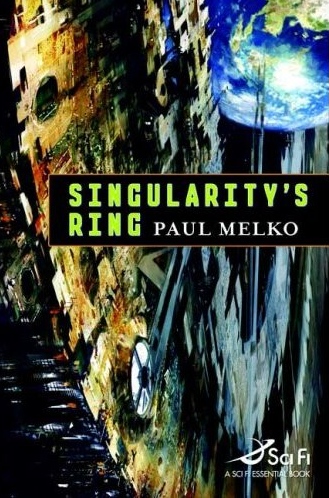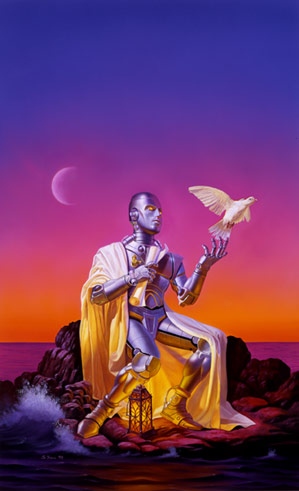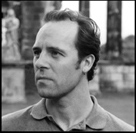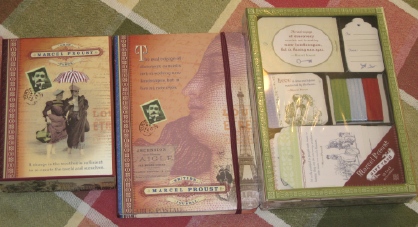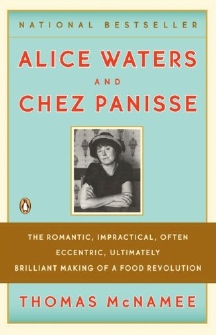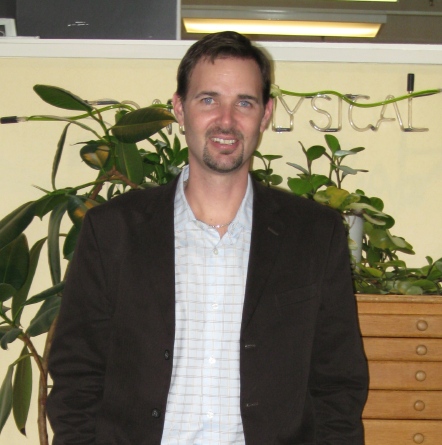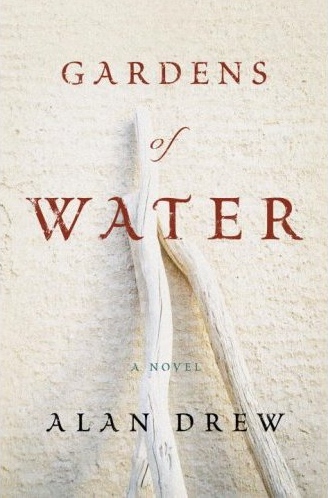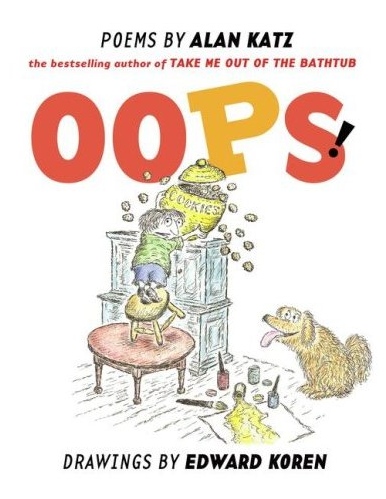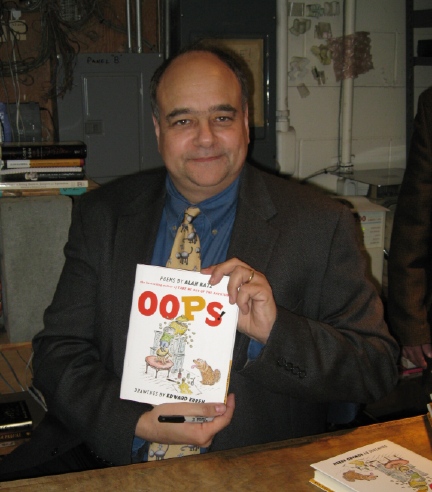|
|
|
|
This Just In...News
From The Agony Column
|
| |
|
03-14-08: NPR First Books Series: Toby Barlow Sorry, Postponed 'till next week; A Review of
Paul Melko's 'Singularity's Ring' by Richard Gingell ; Agony Column Podcast
News
Report : A Conversation With Stephen Youll
|
Werewolf Epic
in Free Verse on NPR Weekend Edition Sunday Next Week
 |
Update: postponed to original air date next week. But do re-tune in!
This Next
Sunday, (one hopes) on Weekend
Edition Sunday, NPR will be broadcasting
my report on Toby Barlow and the rather odd journey
he took when he decided to write 'Sharp
Teeth', an epic story of werewolves in love in free verse. It features
excerpts from my interview with Barlow himself, and as well, Jennifer
Barth, his editor over at HarperCollins. This is a pretty
interesting look inside the world of publishing, from the time a writer
with a truly unique idea first sets pen to paper, or fingers to keyboard,
through getting an agent, selling the book to a publisher and seeing
the book edited and brought to the shelves. I'll podcast unedited versions
of both interviews next week.
Listeners who want to keep this little website going can help by going to
the NPR Weekend Edition Sunday Website on next Sunday morning / afternoon
and using the "Email this Page" link on the URL that I'll provide.
If listeners email this page and it ends up in the Top
25 Most Emailed Stories, NPR continues to give me access to the writers
that you want to hear from. Your support of my work for NPR directly supports
this website, and is greatly appreciated. And heck, I hope you just enjoy
the story! If youre out there thinking about writing your first novel,
here's a look at somebody who did what youre doing and against all
odds succeeded.
|
"Something
Unknowable"
|
|
Trés
70's style book cover. Cool!
|
We're finishing
up the week with a couple of science fiction-related items. First up
is Richard
Gingell's review of 'Singularity's Ring' by Paul Melko.
This is a ScifFi Channel Essential Book, so I wanted to pay attention.
It sports blurbs from Charles Stross and Neal Asher – two of
my favorites. You can find out what Richard Gingell thought by reading
his review here. I havent cracked it, but I will say that the
Singularity better find a new party dress pretty soon. When it starts
showing up at Worldcons, and there are three other girls at the costume
ball wearing the same outfit, oh there will be hell to pay. I think
we're going to have to crank out a new something-punk. Let's see, er,
steam-, cyber-, splatter-, I know – let's all take a cue from
Thomas McNamee, interviewed yesterday, and start a whole new science
fiction genre about food, call it, what – foodpunk? Kitchenpunk?
How about cookpunk? Mealpunk? Meatpunk? Or was there already a meatpunk
-- I can't remember. We have so many punks in science fiction, it's
like we're a gang or something. Or the Band That Couldnt Play
Straight. Why don't we just go to the logical endpoint and call our
new subgenre bandwagonpunk. One size fits all – all aboard!
|
Portrait of
the Artist as Pixels
|
|
The
Positronic Man, from his website.
|
If you read this
column, you've seen the work of Stephen
Youll. In fact, I can say with some certainty, that if you read
science fiction, you've seen the work of Stephen Youll, because he's
been doing book covers for Random House, as
he told me in this MP3 interview, for more than twenty years. I
talked to Stephen about how he started in the trade, how he worked
his way up, and about the changes that both he and book art in the
abstract have gone through. Interestingly enough, we never ended up
talking about specific book covers; we just chatted about his processes,
both as an independent businessman and as an artist. You have to be
both in the world of book cover creation; he told me that he's well
aware that he's not painting a pretty picture, but putting together
a package to sell a client's product. The pretty pictures are apparently
just lovely by-products.
|
| |
|
03-13-08: Remembrances of Things Present ; Agony Column Podcast News Report
: A Conversation With Thomas McNamee
|
Book Geek Gift
|
|
Times
pass. Your heart friggin' breaks. And nobody knows why.
|
I get a lot of great
stuff in the mail, and it is almost always all books. So when I get something
that's not a book, but is definitely book related, and very cool, I pass
it along to you, the readers. In this case, I got three little dealies
in a big ol' padded (and therefore not recyclable) envelope; at first
I thought they were very odd-sized books. But they were not; it was "Marcel
Proust: Of Madeleines and Men' (Clarkson Potter / Random House ; October
2007), a very classy assortment of gift tags, note cards and a journal.
If you're looking to give a writerly, artsy friend of yours a gift, these
might be perfect either for you – the gift tags, that is – or
your intended.
Here's what you get; for $12.95, you get the Marcel Proust Gift Tags, an
assortment of 50 gift tags with a ribbon. The tags are really quite lovely,
and are embossed with quotes from Proust. I like "Love is time and space
measured by the heart." Nice sentiment and a nice card; the design is
gorgeous throughout the three items here. And when you price it out, theyre
not that expensive, not for something that looks this classy.
Next up is the Marcel Proust 5 x 7 Journal at $10.95. It's 160 pages, writable-within
lines, has the strap to keep it closed. Again, and you can see, this is just
classy looking. But be sure not to give it to me, because my handwriting
is so dire that I avoid hand-writing whenever possible. If you've seen one
of my sticky-noted interview prep books, you've seen at least ten sticky
notes that even I couldnt decipher. And I often have to write the
same thing down twice, because I'll write something and right there, can't
read it.
And finally, we have the Marcel Proust Gift Cards ($12). They're 4 3/8" by
5 7/8", truly, madly beautiful; you get 16 cards / 4 designs, with 17
envelopes. Send one to someone you wish to love you.
All of these items are listed as "By Scott Russo," with
images from Wonderstock. I'm guessing the Russo put the project together
and did the design; I'm here to say nice job. And more importantly, my wife,
the Creative Director (not of my site, otherwise it would look a lot better),
gave them her stamp of approval, so I know it's not just a book geek thing
going on here. Here's an example of nicely done book paraphernalia. I know
I suggested that you buy them as a gift for someone, but if you do, dont
be surprised if you just use one of the tags on the gift you do decide to
give. If you have to buy them for someone else to get them for yourself,
well, that's one way to work the system.
|
Agony Column
Podcast News Report : A Conversation With Thomas McNamee : 'Alice
Waters and Chez Panisse'
We've changed the
world, one meal at a time. It's hard now to remember that not so long
ago all the foodstuffs and inclinations we now have
were utterly unknown and even in some cases, unthinkable. But, as Thomas
McNamee reminds us in 'Alice Waters and Chez Panisse' (Penguin ; February
28, 2008 ; $15), it wasn't always that way. His book is the story of
how Waters, who did not consider herself a chef, or a writer, or a
revolutionary, managed to, through sheer force of will, er – change
the world, specifically by cooking brilliantly, writing brilliantly
and managing a restaurant; well, maybe not so brilliantly, but then
Chez Panisse is still around and a lot of restaurants aren't. McNamee
came down to the Capitola Book Café to talk about his riveting
story of how a young girl who happened to go to France ended up transforming
our culinary and cultural world.
McNamee's book is wonderfully written, with a prose and narrative flow
that is perfectly reminiscent of the fabulous meals he describes and
even gives recipes for. Alice Waters is a riveting figure in McNamee's
narrative, a grand character who seems to have created the life of
a novel's heroine for herself. McNamee captures in prose the wild times,
the complicated and kind of creaky life that Waters carved out for
herself. This is a side of the food revolution that weve not
seen, and it's heartening to see it so well portrayed here. For all
the conflicts and fights that emerged between the headstrong personalities
who stomped and tip-toed through Chez Panisse, McNamee finds a sort
of sweetness, an underlying positive force that embodies the best aspects
of the sixties, wrought large in our world today. Alice Waters and
Chez Panisse have changed the way the world eats; McNamee lets us understand
and care how and why it happened.
We love our food here in Santa Cruz, flavorful and organic. We like
our books the same way, and better still if the subject is food. McNamee
had extensive access to Waters when he wrote this book, and she's a
fascinating character, a woman with an inner vision that she manages
to realize in spite of both herself and the world around her. Battles
are fought within and without and the readers gets to see them all,
to taste them all – literally, as there are recipes in here as
well. Hats off. Time to eat; here's the link.
|
| |
|
03-12-08 : Makes You Think
|
Book-Tech, RAM
and Why Kindle Will Not Ignite Readers (but may prove useful to
writers)
|

|
I
think this looks particularly cheap and ugly.
|
As I read Cory
Doctorow's latest column on "E-books," I was happy to
have that wonderful experience one gets now and again from reading – it
made me think. I like what Cory said, but my thoughts went along a
rather different route. Like many readers with lots of paper books,
the very idea of "E-books" kind of grosses me out. Granted,
I'm not fond of video games either. But as far as the evolution of
books and reading goes, I dont think they're particularly significant – to
readers, at least. They do have a use and a definite audience, but
it's not the people who buy paperback or hardcover books on a regular
basis. They're simply an obvious use of existing technology, a realization
of straightforward extrapolation and thus, not very interesting.
In fact, old-fashioned books are a much more interesting technology. They're
one of the most robust and oldest techs around. We're coming up on six hundred
years, and though the manufacturing technology behind books has gone through
several revolutions, books themselves have not changed a whit since Gutenberg
first printed a Bible, and even arguably before that. Faced with the hardware
of a book, be it a bound and printed set of pages, an "E-book," or
an illuminated manuscript, it's easy to miss the actual tech under the manufacturing
tech. The actual tech underlying all books is the concept of putting language
into a written format and assembling texts. It's the intellectual equivalent
of a lever or a pulley, one of the basic "mind machines" that enables
us to leverage our minds beyond their raw capability. Following
language itself, then math, books are the third simple mind machine.
Thus the manufacturing process behind books is itself important only in how
it enables us to distribute and use them. Think of the current pace of technological
change, the hallowed Moore's Law and its corollaries, and the idea of a tech
that hasnt changed in six hundred years starts looking pretty remarkable.
And "E-books" in their current form are a particularly clunky incarnation.
Using the same extrapolation that lead to the "E-book," one can
easily envision that some ten or so years down the road, we'll have smart
paper, a single-sheet portable display that's able to do everything a computer
screen or television does in the size of an 8 1/2" by 11" piece
of paper. Using the beloved blood-sucking subscription economic model, vendors
will fill your smart paper with whatever you want to read or see. But as
far as reading goes, the "book machine" of smart paper isn't all
that different from a Gutenberg Bible. It's just cheap and new, has different
distribution possibilities, but it's not a successor to the book in terms
of intellectual machinery.
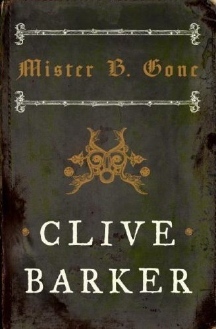 |
|
| The
book that asks readers to ignite it! |
All this Gutenberg
stuff comes up in part because I
just finished reading Clive Barker's increasingly
interesting 'Mister B. Gone.' In the realm of "makes you think," Barker's
short supernatural novel really delivers. The concept behind the
book (and the irony is not lost on the reader or the writer) is
that the invention of the printing press proves to be a supernatural
hinge point, a potential or actual Apocalypse attended, in Barker's
vivid vision, by hosts of angels and demons that are different so far
as humanity is concerned in name only. Barker truly gets the nature
of the printing press – it's a singularity, an end to history,
and what else is an Apocalypse but a supernatural version of science
fiction's favorite hobby-horse of the last ten years?
Books changed everything, and cheap books changed everything more. "E-books" aren't
cheap, nor are they as robust as the most humble mass-market paperback from
1972. They offer little more conceptually than a regular book. And even though
paper-page books were around before the printing press, it was Gutenberg's
invention that truly pushed them over the top. All the refinements of manufacturing
technology havent changed that, and even if extrapolated to their
ultimate end, smart paper, they won't.
What people are looking for in "E-books" and smart paper is the
next simple mind machine, a new intellectual lever. They aren't it, but we
do have that machine, in about the same state as the illuminated manuscripts,
today labored over by new monks. Forget the "E-book." Sorry to
be boring, but the next intellectual machine is here and its called
Random Access Memory – RAM. It's not whiz-bang new glamorous, and it's
not ready to bring about an Apocalypse, but give it time. Somebody will figure
it out, and in so doing bring about Science Fiction's beloved Singularity.
Or the Biblical Apocalypse, attended by Barker's demons and angels. (Think
humans with RAM.) That's to come, and all we have to do is hope we dont
kick the bucket before it happens, or hope we do, depending on you feelings
about living through Apocalypses.
In the interim, we still have these newfangled devices, "E-Books." I
can't imagine buying a Kindle or Sony E-Book to actually read on, though
publishers are already trying to push "E-copies" of books onto
book reviewers. Good luck with that! Given the flood of fantastic reading
that lands on my doorstep, why would I bother to put myself through the Agony
of reading a PDF? It would take a very special case to make that happen,
and even then, I'd be leery. And I'd hate to print it out; reading unbound
sheets is nearly as painful as reading from a screen, though certainly more
portable. There are just too many good, real books out there.
But there is a substantial, perhaps and growing market for the current clunk. When
I talked with Charles Stross last year, he joined me afterwards for a
wonderful lunch at a restaurant by the ocean in Santa Cruz. While we chatted,
he pulled out his latest toy, a Sony "E-book" gadget. He wasn't
using it to read other people's work, but his own, at readings and while
traveling. I could see the utility. Here is a very useful niche for the "E-book" – it's
not so hot for readers, but it's pretty damn nice for a writer hoping to
read his own work, either with an eye for revision or at readings. And I'd
suggest that the publishers who hope to have reviewers read what is essentially
an "E-book" do the math. How many ARCs equal the cost of one "E-book?" I'm
guessing not too many. It bears thinking about. In the interim, you can hope
that reviewers themselves buy "E-books." Frankly, I pay a boatload
of money to run this site and publish the reviews I write. Reviewing is generally
not a source of income; its a passion, and one reviews because one
has to say something about this book or that book. Generally, paper books.
And I likes me paper books. As it happens, they are just as effective as
any "E-book" is, or even an Internet-only article. They make me
think.
|
Agony Column
Podcast News : A 2006 Interview with Dr. Bruce Ames : "Fear
is easy to sell"
Back in 2006, I
was working on a piece for NPR on the conversation within the science
fiction genre about global warming. As part of the background for
the piece, I was privileged to speak with Dr.
Bruce Ames, a distinguished Professor of Biochemistry
and Molecular Biology, University of California, Berkeley, and a Senior
Scientist at Children's Hospital Oakland Research Institute (CHORI).
We talked about his dustups with the environmental movement, which
have to do with cancer-causing chemicals in the environment. He's a
smart scientist, an interesting guy and you're going to hear things
said you wont expect to hear. He also gets mentioned by Michael
Pollan in 'The Omnivore's Dilemma'; they're practically neighbors in
terms of where they work. You won't look at your broccoli the same
way after hearing Dr. Ames; but then you'll still be dipping it in
fat-free ranch dressing. Here's
a link to the MP3; remember, fear sells. That's true in any realm.
|
| |
|
03-11-08 : A 2008 Interview With Alan Drew
|
'Gardens of
Water'
|
|
Go
ahead, ask him. He's on tour.
|
Begin your life
again. It may restart at any moment without your permission. Ask Alan
Drew.
Back in '99, things were fine, they were more than fine. Well, compared to
today, at least. World generally at peace, world economy looking incredibly
bright, and the worst thing happening in the White House was a sex
scandal.
Damn, we could use a good sex-scandal presidency now, don't you think? You
need but just look around to consider the alternative.
Alan Drew and his new wife were starting anew. Recently married, both English
teachers, they decided to start their lives with an adventure, teaching English
in China. But as fate would have it, there were no schools in China that
needed two English teachers. Disappointed they started to leave, but found
themselves in front of the desk for a school in Istanbul, Turkey. Exclusive
joint for the hoity-toity. They signed up, then showed up in Istanbul on
August 13, 1999, to begin their lives again. Four days later, the Izmit earthquake
struck, restarting their lives without their permission. It was a whole new
world.
Alan Drew's first novel, 'Gardens of Water' (Random House ; February 5, 2008
; $25) draws upon his experiences after the earthquake. He tells me the specific
genesis of this novel in my interview with him, available
as an MP3 from this link. The novel itself is quite powerful if rather
alien in perspective. I actually told Drew that he ought to consider writing
science fiction. His main POV character is Sinan, a devout Kurd Muslim whose
family is displaced after the earthquake and whose daughter is so-briefly
freed from the strictures of her religious upbringing. In powerful, closely
written prose, Drew embeds us in the mind of a man who will seem less familiar
to many than a space alien. Everything is there for you to understand why
Sinan does what he does; but though you may like the character, you may not
like what he does or what unfolds in the course of this powerful drama. It's
plain weird to the Western mind, strange and sort of creepy.
But one thing is certainly true, at least for me. As I read this book, I
couldnt
help but think that the chaotic aftermath scenario that Drew describes so
well, a place where the past and the future are jumbled and mixed up by forces
beyond the power of either to control, is our future. Start this book in
the bookstore and be prepared to bring it home. Drew's vision is extraordinary;
'Gardens of Water' sports one of the best descriptions of a disaster and
aftermath I've ever read. Sinan's perspective is haunting and alien, like
something you'd encounter in 'Dune'. Take a sip of the water; you'll bring
home the garden, and hope life doesn't start anew for you.
|
| |
|
03-10-08: A 2008 Interview with Alan Katz
|
Oops!
|
|
A
goofy book for kids and the habitually immature. |
We're told that comedy
is hard by people who should know; but for some folks, that simply cannot
be the case. Alan Katz is one of those people
find funny easy. It just happens when he's around. I must admit, I didn't
exactly know what to expect. Katz is the author of the Silly Dilly Songbooks,
(parody songbooks for children with titles like 'Take Me Out of the Bathtub'
and 'On Top of the Potty'), the Stinky Thinking books ("Gross Games
and Brain Teasers"), That's Right, That's Wrong!, a trivia game
for children and his most recent book, 'Oops!' (Margaret K. McElderry
/ Simon & Schuster ; March 4, 2008 ; $17.99), aimed at children ages
4 to 8. That said, one must note that the book is illustrated by no less
than Edward Koren, the justly famous cartoonist for The New Yorker. And
Katz is brilliant at what he does with poetry for kids. He incorporates
natural, conversational language, goofy rhymes and juvenile humor. I'll
admit it, I'm kind of a sucker for juvenile humor. I was one of those
kids who really got interested in reading about the time I discovered
Mad Magazine when we vacationed on a houseboat in the Sacramento River
Delta. Before the interview, I would have asserted that I was not in
Katz's target audience; having spoken with the man, well, if I could
shed as many pounds as I did years, I'd be starvingly skinny. Katz was
a delight to speak with.
|
|
A
goofy writer signs stock at Capitola Book Café.
|
Of course, the children's books are not the only things he does. He's
written for lots of television, including the Grammy and Tony Award ceremonies,
Taz-Mania, Disneys Raw Toonage and Goof Troop and the Rosie O'Donnel
Show. Get this: he was writing for Henny Youngman in college – seven
bucks a joke! And in the interview, he confides that his parents thought
that Youngman might have been using jokes he hadn't paid for; after all,
how would they know!
I've done lots of interviews, but none that had me laughing (as silently
as possible) till I was in tears – until now. Katz isnt
just funny, he's also a remarkably astute businessman, and if youd
care to learn about the biz side of writing, heres your chance.
This is
a link to the MP3 of our interview. This is the time of your
life, say 40-something minutes. Be careful about what you're doing when
you listen to this one. You're listening to the man who wrote "On
Top of the Potty," the man who hauled out the word – I wont
say it, but it's a bit naughty – in front of a meeting of hundreds
of librarians and poets, serious types. Until they heard Katz. Life seeming
a tad too serious? Here's
the cure.
|
| |
|
|

